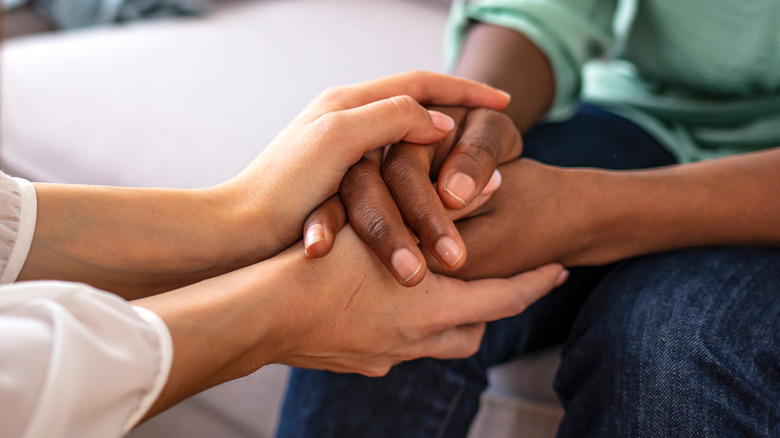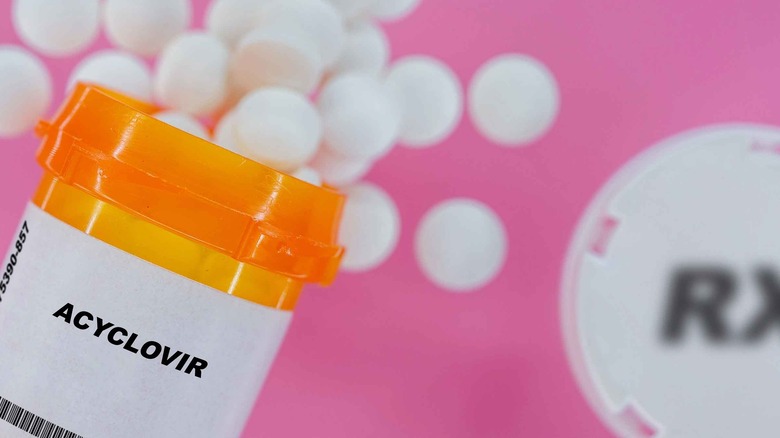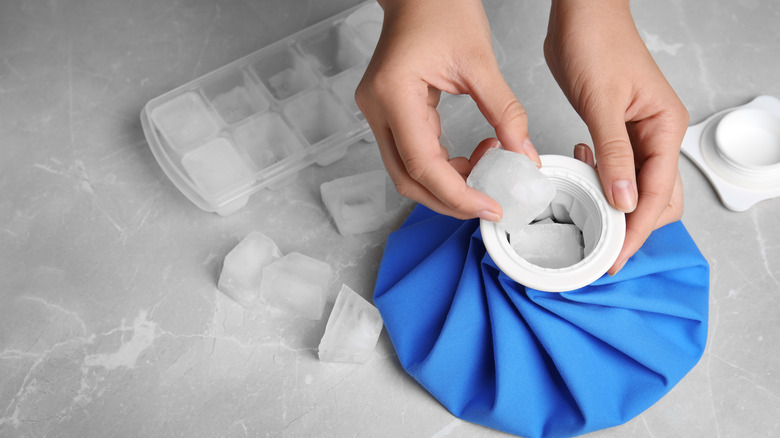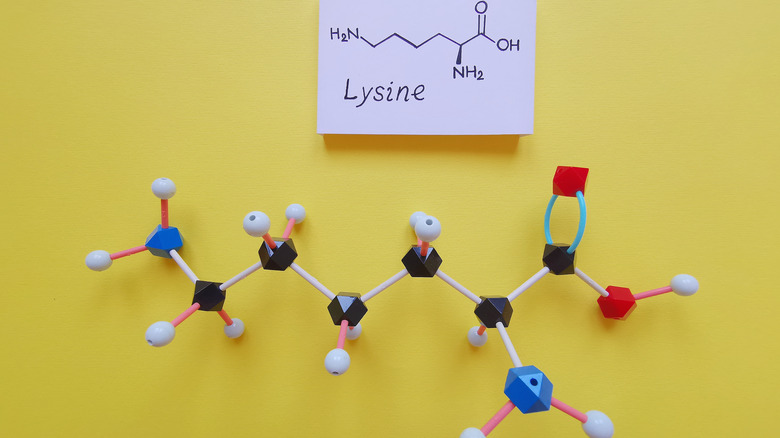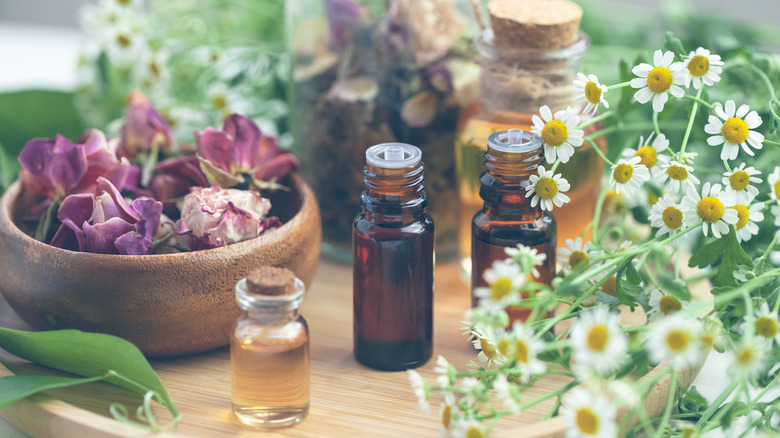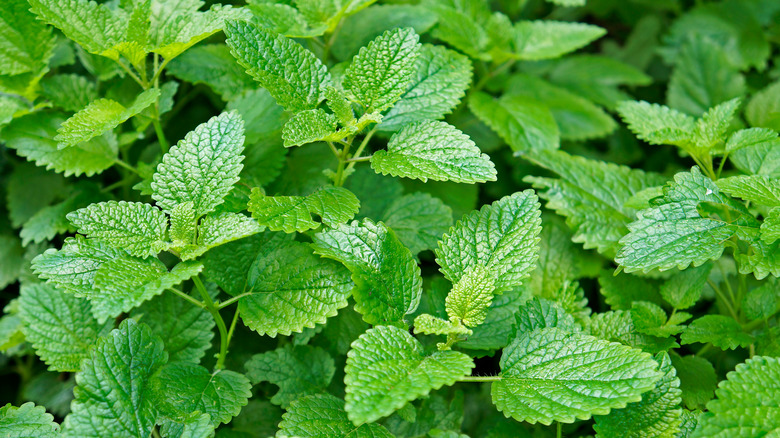Herpes Explained: Causes, Symptoms, And Treatments
There is no cure for herpes, so if you get it, you have it for life. But before you have an anxiety attack about that, let's go over some of the facts. At first, a herpes diagnosis can feel earth-shattering — which is understandable and totally valid — but it isn't as life-altering as you may think. There is a huge stigma around herpes, mainly because the general population (and even some doctors) are uneducated about it (via The Washington Post). Before you assume that someone with herpes is gross or untouchable, you may want to read up a little more on it — and get tested. That's because you might have it and not know it.
In fact, more than half of people worldwide have herpes. There are actually two types of the herpes simplex virus (HSV): HSV-1 and HSV-2. About 3.7 billion people under the age of 50 (that's 67% of the world's population) have HSV-1, which is commonly referred to as oral herpes. And an estimated 491 million people between the ages 15-49, about 13% of the global population, have been diagnosed with HSV-2, often called genital herpes (via the World Health Organization).
Also — it is possible to get HSV-1 genitally and HSV-2 orally — more on that later.
You may have it and not know it
Many people can actually unknowingly have HSV — and might be accidentally spreading it to others — because the symptoms are often mild or even nonexistent. Most people who have herpes are asymptomatic, and if they do experience symptoms, they might not notice them or just assume it's a random skin condition (via Center for Disease Control and Prevention).
One of the contributing factors to this dilemma is because HSV is often not included in a standard STD (sexually transmitted disease) test. Many might mistakenly assume if they've gotten an STD test recently and nothing came up, then they're in the clear. However, many medical professionals won't test for herpes unless a patient is actively experiencing symptoms or requests to be specifically tested for HSV. In fact, about 90% of people who tested positive for HSV-2 had never experienced symptoms before or been tested for it previously (via The Washington Post).
Signs and symptoms
For those that do experience symptoms, they vary depending on how long you have had HSV. Have you ever heard of a cold sore? That's herpes. HSV-1 symptoms usually occur on or near the mouth and are commonly called cold sores or fever blisters because people typically experience them when they are sick, because the immune system is low (via Minars Dermatology). HSV-2 symptoms are usually present on or near the genitals or rectum.
For many, the first outbreak is usually the worst, with painful blisters, itching and discomfort, and sometimes even flu-like symptoms, like a fever, body aches, headache, and swollen lymph nodes. Often people experience a tingling or burning sensation on the skin where the blisters may eventually form as a warning sign for an incoming outbreak (via the World Health Organization). On average, people get their first outbreak four days after initial exposure, but it can range anywhere from two to 12 days. The first outbreak can take up to two to four weeks to fully heal. And unfortunately, reoccurring symptoms are common.
One study reports that 33% of people with oral herpes and 50% of those with genital herpes experience additional outbreaks at least once in their life. However, the good news is it does get better — symptoms tend to heal faster and feel less intense as time goes on. And research has shown that the frequency of outbreaks usually lowers over time (via the Center for Disease Control and Prevention).
Causes
So how do you get herpes? HSV is often considered an STD because one of the primary reasons it can be transmitted is through sex. HSV-1 is usually spread by kissing, while HSV-2 is commonly transmitted by vaginal or anal sex (via Healthline). You can get HSV from contact with the virus that is present in sores, saliva, genital fluids, or the skin on or around the mouth, genitals, or anus. However, while not common, it is also possible for HSV-1 to be transmitted through oral sex, especially if someone is experiencing cold sore symptoms (via the World Health Organization).
While the chances of getting or spreading herpes are highest when sores are present, it is possible to pass it on even if the skin looks normal. The chance of spreading herpes from sexual activity with active sores is about 20% — but this risk is cut in half when no symptoms are present — there's only a 10.2% chance of getting HSV when asymptomatic. And if you wear a condom, the risk cuts in half again, to only about 5% (via STD Center).
You can't get herpes from a toilet seat
Time to bust the myth: It's not possible to get HSV from a toilet seat, according to the Center for Disease Control and Prevention. You will also not get herpes by touching things like blankets, sheets, swimming pools, silverware, soap, or towels. Primarily, herpes is spread through skin-to-skin contact — HSV simply can not live outside of the human body for very long, so the chances of getting it from touching a surface or object are extremely low (via Healthline).
That being said, sharing sex toys or straws with someone who is experiencing symptoms directly after they have used the item is probably not a good idea, since it is possible to get herpes from an object that has come in contact with the virus by saliva or genital fluids, explains Healthline. But you don't have to avoid public bathrooms or stress about sharing a bed with someone.
The talk
For better or worse, if you have HSV, it's time to get comfortable with talking about sex. You should always have the "safe sex" talk whenever you get into bed with someone new, for your own health and safety. Knowing how to confidently and accurately inform your potential new sex partner about your STD status with facts — and no additional shame or guilt — will be hugely helpful for you. According to VICE, those with HSV generally advise others to disclose before anything sexual happens, that way your prospective new partner can have a chance to think about it and ask questions.
It's also a good idea to talk things over while sober, so that you're both certain clear communication, decision making, and consent is happening. While having this type of conversation early on in a relationship may feel very vulnerable and you may fear rejection, you may also find that many people will react with non-judgement and appreciation — and those that respond negatively probably weren't worth your time anyway. You might also find that disclosing gets easier over time after practicing it — whether that's in front of the mirror, with a friend, or several potential partners is up to you.
Prevention
If you have herpes, you are not doomed to celibacy. While it may seem intimidating to get back out there given the stats, there are many ways you can have sex while reducing the risk of getting or spreading HSV. First and foremost, if you or your sex partner are experiencing any symptoms, avoid sexual activity that involves oral, genital, or anal contact, since HSV is most contagious when there are existing sores. But that doesn't mean that all intimacy is forbidden. Those diagnosed with HSV shared with VICE that they use an outbreak as an invitation to explore other forms of sexual connection with their partner, like mutual masturbation or using toys. Think of it as a way to get creative in the bedroom.
Also, using protection like condoms can help prevent HSV transmission. There's a 5.15% chance of spreading HSV while using a condom during penetrative sex, whether you're experiencing symptoms or not (via STD Center). HSV transmission is still possible while wearing a condom because it only covers so much surface area and there may still be some skin-to-skin genital contact (via the World Health Organization). Taking anti-viral prescription medications can also help greatly reduce the risk of HSV transmission, as well as the frequency and severity of symptoms (via Medical News Today).
Anti-viral medications
There are several different types of oral prescription anti-viral medications. Everyone's different, so the best treatment option for you depends on your body, the type of HSV you have, and your symptoms. The three main kinds of anti-viral meds commonly prescribed by doctors include Acyclovir (Zovirax), Famciclovir (Famvir), and Valacyclovir (Valtrex). In general, these medications not only help decrease the pain and discomfort of sores and speed healing, but they can also help prevent future outbreaks and reduce the risk of spreading it to others (via Healthline).
If someone with HSV experiences frequent outbreaks, often their doctor will prescribe one of these medications as suppressive therapy. In addition, Acyclovir can help reduce the chances of HSV from spreading to other parts of the body, which can happen in those with weakened immune systems. There are also topical anti-viral creams sometimes used for HSV, like Abreva, which is commonly used for cold sores.
Home remedies
There are many at-home remedies you can try to help reduce the pain and irritation associated with HSV symptoms. It's important to always speak with a doctor about treatment options before trying anything. Medical News Today recommends trying over-the-counter pain meds like acetaminophen or ibuprofen, or taking a sitz bath or warm epsom salt bath to help relieve pain. You may also want to try applying natural products to the irritated area, like aloe vera gel or petroleum jelly. Wearing loose clothing and avoiding sexual activity can also help reduce the chances of pain and irritation.
Another at-home remedy that could be helpful is making a topical paste out of baking soda or cornstarch, according to Healthline. It may help to dry out the sores and reduce itchiness. To try it out, you can soak a Q-tip or cotton ball in warm water, sprinkle a little bit of powder on top, then apply directly to the affected area. You might also want to try applying apple cider vinegar topically, since it has anti-inflammatory and antiviral properties. Just be sure to dilute it by mixing one part vinegar with three parts of warm water, then applying it to the sores with a cotton ball or wash cloth.
Alternate hot and cold treatment
Another beneficial natural remedy is the application of hot and cold treatments, which can help reduce pain, increase circulation, lower inflammation and support healing. This can be done with compresses or simply by using water. For example, you could take a warm shower or bath, then apply a cold compress to the irritated area.
According to eMediHealth, a cold compress can be applied for about 10 minutes at a time every couple of hours. To apply, you can wrap an ice pack or ice cubes in a clean, soft towel or wash cloth — never apply ice directly to the skin. You can also use a heating pad instead of taking a hot shower, or try making your own lemon balm tincture. "Mix a few drops of the lemon balm tincture in water or olive oil and then use a clean cotton pad to apply this liquid to the affected area" (via eMediHealth). Heat application may help reduce the appearance of sores, according to one scientific study published in Canadian Family Physician.
Diet changes
Some people find that watching what they eat helps prevent or minimize HSV symptoms. Plus, a healthy diet can support your immune system, which can minimize outbreaks. Focus on eating lots of veggies high in antioxidants, like cauliflower, spinach, kale, and tomatoes. Also, add in foods rich with omega-3 fatty acids, which can decrease inflammation and boost immunity, like salmon, flaxseed, and chia seeds. Healthline also recommends eating foods with a lot of Vitamin C, which support your immune system and speed the healing of sores, like bell peppers, oranges, strawberries, mango, and papaya.
Protein heavy foods are also helpful for fighting herpes, especially those high in the essential amino acid lysine and low in arginine. One study suggests that consuming high amounts of lysine, like 3 grams per day, in conjunction with a low-arginine diet, can help with HSV symptoms. Many animal products are rich in lysine, like yogurt, chicken, and cheese; however, there are many vegetarian sources of lysine as well, including avocados, chickpeas, soy, lentils, cashews, beets, potatoes, and so much more (via Healthline). It's also a good idea to limit your consumption of alcohol, processed foods, and sugar to avoid outbreaks.
Supplements
Some supplements might be able to help support your immune system and reduce the occurrence of outbreaks. Make sure to check with your doctor about adding supplements into your daily routine, since some can interact with prescription medications and over-the-counter treatments. Zinc can help boost immunity and is often taken for the common cold — some take it to help reduce the likelihood of herpes outbreaks, too (via Healthline). Vitamin B can help strengthen your immune system, as well as increase energy and growth of healthy cells in the body, which can all help your body's defense system fight an outbreak. Probiotics and Vitamin C supplements can also help support your immune system.
In addition to eating foods rich in lysine, you can also take lysine in supplement form. While more research on lysine needs to be done, some studies suggest the "typical" dosage is 1,000 milligrams per day. Talk with your doctor to figure out what dose is best for you. Another supplement option that is high in lysine is spirulina, which is a natural algae that is processed for human consumption (via Healthline).
Herbs and essential oils
Many herbs and essential oils can help support healing, resulting in a faster recovery time and decrease uncomfortable HSV symptoms. Essential oils should never be directly applied to the skin, as they are very potent and can burn or irritate it. You should dilute an essential oil with a carrier oil, like jojoba, olive, or coconut oil, before applying it. Healthline recommends trying out a patch test by applying your diluted oil to a different part of your body (other than the sores) to test it and make sure it doesn't irritate your skin.
Try applying a small amount of the diluted oil to your forearm and monitor it for 24 hours — if you experience any burning, irritation, or inflammation, wash it off with soap and water and don't use it again. If you don't experience any adverse effects, it should be safe to use on an outbreak. Some antiviral herbs that you could apply topically include tea tree oil, eucalyptus, ginger, thyme, oregano, licorice, echinacea, and lemon balm.
Lemon balm
Lemon balm is one of the most common herbs used for soothing HSV symptoms. This herb has strong antiviral properties that can stop the replication of the herpes virus (via Medical News Today). When used topically, lemon balm has been shown to not only reduce redness and swelling after a couple days, but it also helped speed the healing and prevent recurrence of symptoms. Both doctors and patients have shared that lemon balm ointment is effective and efficient. If you can not find lemon balm essential oil or topical ointment, you can apply the tea topically to an outbreak. To do so, the University of Maryland Medical Center recommends steeping about 2 to 4 teaspoonfuls of dried lemon balm leaf in 1 cup of boiled water for 10-15 minutes. Strain it and allow the tea to cool — you can place it in the fridge or freezer to speed up this process. Dip cotton balls or a clean wash cloth into the tea and then apply it to the sores. You can repeat this throughout the day for relief.






